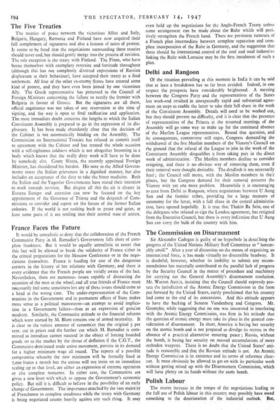The Commission on Disarmament
Sir Alexander Cadogan is guilty of no hyperbole in describing the progress of the United Nations Military Staff Committee as" lament- ably small." After a year of discussion on the means of organising an international force, it has made virtually no discernible headway. It is doubtful, however, whether its inability to submit any recom- mendations has materially contributed to the parallel lack of progress by the Security Council in the matter of procedure and machinery for carrying out the General Assembly's disarmament resolution. Mr. Warren Austin, insisting that the Council should expressly pro- tect the jurisdiction of the Atomic Eriergy Commission in the form put forward by the United States, curtly proclaimed that his country had come to the end of its concessions. And this attitude appears to have the backing of Senator Vandenberg and Congress. Mr. Gromyko, while suggesting that no one was interested in interfering with the Atomic Energy Commission, was firm in his attitude that the question of atomic energy must take its place in the general con- sideration of disarmament. In short, America is basing her security on the atomic bomb and is not prepared to divulge its secrets in the absence of a practical alternative ensuring peace ; Russia, without the bomb, is basing her security on massed accumulations of more orthodox weapons. There is no doubt that the United States' atti- tude is reasonable and that the Russian attitude is not. An Atomic Energy Commission is in existence and its terms of reference clear- cut. It must obviously be allowed to get on with its particular work without getting mixed up with the Disarmament Commission, which will haVe plenty on its hands without the atotn bomb.


































 Previous page
Previous page